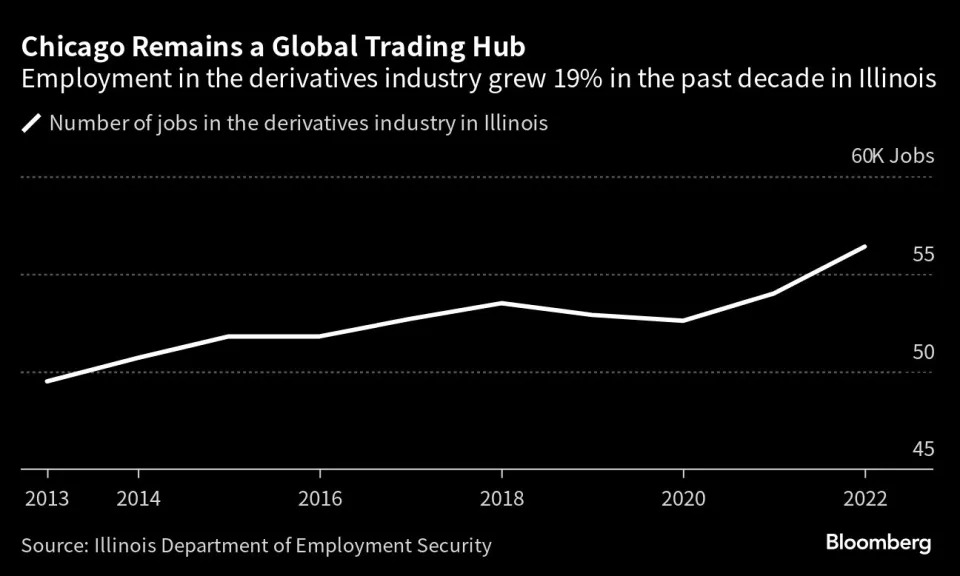(Bloomberg) — The letters are stamped all over the hallways of Chicago’s giant skyscrapers and grand office buildings. DRW, IMC, CME, Cboe.


by Isis Almeida
Mon, September 18, 2023 at 10:29 AM CDT·7 min read
Trillion-Dollar Industry Powering Chicago at Risk of Leaving
Most Read from Bloomberg
- Xi’s Missing Defense Chief Opens Door for US Military Talks
- How Auto Executives Misread the UAW Ahead of Historic Strike
- Trillion-Dollar Industry Powering Chicago at Risk of Leaving
- Vegas’ Newest Resort Is a $3.7 Billion Palace, 23 Years in the Making
- US Asks for Help Finding Missing F-35 Fighter Jet After Crash
These are some of the derivatives firms that collectively handle trillions of dollars a year in trades, greasing the wheels of global markets with everything from stock options to corn futures. Most of them have called Chicago home for decades — providing thousands of jobs within the city’s $75 billion finance industry.
Now, the firms’ commitment to the Windy City is being tested by some $800 million in taxes proposed by a new mayor staring down a budget gap that’s swelled to half a billion dollars. One idea is a levy on financial transactions, which has alarmed companies already worried about a jump in crime that shows few signs of abating.
Behind the scenes, market makers and exchanges are working together to press their case with policymakers, with firms that typically compete with each other sharing data to help explain their economic benefits to Chicago. While executives haven’t explicitly threatened to leave, in private conversations it’s clear they will consider quitting the city if crime remains an issue and the financial transaction tax passes.
“We don’t want to leave,” said Ed Tilly, the chief executive officer of Cboe Global Markets Inc., the firm behind Wall Street’s so-called “fear gauge,” the VIX. “But we cannot be in a position where we are disadvantaged in the most competitive markets in the world, where our competitors don’t face the same economics that we would.”
The city is in a tough spot. Officials are projecting a $538 million budget deficit next year, with spending pressured by inflation and a surge in asylum seekers who have arrived in Chicago with no money or means of support.
The derivatives industry, home to some of the most profitable businesses in the city, is a tempting target to plug that gap. Just CME Group Inc. and Cboe, the two firms that are publicly traded, had combined adjusted income of more than $3.6 billion last year.
Mayor Brandon Johnson’s office said that no decision has been made on a transactions tax and the administration is open to dialogue with businesses. Jason Lee, a senior adviser, noted that Chicago has a diversified economy and “we are lucky we don’t depend on a single industry.”
“We know the financial transaction one has been highly debated and there may be merit in that, but we look forward to that debate,” he said. “What the mayor has said is that solutions cannot disproportionately impact the working and middle class of our city.”
Any firm mulling a move would likely get a friendly reception from economic development officials in Texas, Florida or other Sun Belt states that have seen a wave of relocations since the start of the pandemic. New York and California have each lost companies that managed close to $1 trillion of assets.
The exodus from Chicago hasn’t been as severe, but the city suffered a reputational blow last year when finance billionaire Ken Griffin moved his Citadel business to Miami, citing out-of-control violent crime and chronic budget problems that plague the state.
Months later, Johnson, a progressive Democrat, surprised pundits by beating incumbent Lori Lightfoot in the mayor’s race. Crime was a top issue — with incidents reported to the police up 54% since 2019 — and he ran on a pledge to invest $1 billion to make a “safer and stronger city.”
But in the midst of the campaign, Johnson promised not to raise property taxes, a pledge he stuck to in his 2024 budget proposal released Sept. 13. That’s left him very limited options for coming up with the money.
One of his campaign proposals would generate $20 million annually by reinstating a $4 per employee tax on big businesses. An additional $100 million could come from raising the levy on high-end property purchases — the kinds of homes bought by wealthy finance workers.
Most importantly for the derivatives industry, Johnson has floated seeking another $100 million with a levy of $1 to $2 for every securities contract traded. That would boost costs by as much as 800%, according to CME.
100 Days
Some levies might be more palatable if there were encouraging signs the city is moving in the right direction, but just over 100 days into his administration, Johnson has yet to corral crime, with robberies up 24% and vehicle theft almost doubling this year even as murders fell 10%.
While Johnson’s proposal to slap a so-called mansion tax on sales of homes worth more than $1 million is likely headed for a referendum, he’s been quiet on the headcount tax and the financial transaction levy. Illinois Governor JB Pritzker, who would need to approve a transactions levy, opposes the idea, saying he’s worried “it would be easy for those companies and servers to move out of the state.”
The Chicago Association of Realtors is urging City Council members to vote against holding a referendum on the increase in real estate transfer taxes. The group argues the measure will make housing more expensive, increase rents and discourage construction of new homes.
Packing up and leaving isn’t as hard as it used to be in the heydays of trading floors, when dealers wearing colorful jackets roamed the streets of Chicago and shouted orders at each other in the city’s infamous pits.
Trading has moved to electronic screens. And the computer servers where transactions are matched can be easily relocated elsewhere to potentially dodge the tax. In fact, Cboe’s servers are already in New Jersey.
Ralph M. Martire, executive director at the nonpartisan Center for Tax and Budget Accountability, says the mayor is in a tough spot as he tries to shore up the city’s finances.
Johnson “is recognizing that the city of Chicago can’t continue to operate with its current revenue stream,” Martire said, adding that keeping property taxes steady is, however, untenable.
As the city looks to boost revenue, Chicago businesses perceive they’re under attack from politicians hostile to wealth, according to Justin Marlowe, a professor at the University of Chicago Harris School of Public Policy.
The sense is “this is all part of a larger trend, a view among the emerging dominant force in Chicago politics that there’s a lot of money to be taken out of the pockets of wealthy folks and big business,” Marlowe said. He added it’s in the industry’s best interest to showcase its contributions to the city.
Top of Mind
Chicago’s derivatives industry started in the late 1800s, when the Chicago Board of Trade began futures trading and what’s now known as CME was founded as the Chicago Butter and Egg Board — an agricultural commodities exchange. The city’s position in the heart of the Midwest was key. After all, Illinois is still today the only state where all major freight railways meet.
Over the years, former employees of the exchange left to start their own firms. The derivatives industry now employs some 58,800 people in Illinois, expanding 19% over the past decade. That trounces the state’s overall employment growth of 5.9% in that span.
Real Estate Boom
The industry has also been a boon for commercial real estate. While corporate downsizing since the pandemic has left parts of downtown hollowed out, 60% of the trading companies that have signed leases since 2020 have expanded their footprint in the city, according to Jones Lang LaSalle Inc.
The Chicago firms that are sharing information in an informal group include Cboe, market makers Optiver Holding and IMC Trading, as well as DRW Holdings, best known for high-frequency trading. They want Johnson to know that the economic benefits could be at risk if rampant crime makes it too hard to recruit talent or a transaction levy puts the industry at a disadvantage to peers including Intercontinental Exchange Inc. in Atlanta and Nasdaq in New York.
A spokesperson for CME CEO Terry Duffy, who isn’t part of the group but has shared similar concerns in the past, said he has had a “very productive” meeting with the mayor.
Johnson often speaks of an economic vision for the city that seeks to address inequality and past injustices. Lee, his senior adviser, said the mayor looks forward to discussing his proposals with the derivatives firms.
–With assistance from Alex Tanzi, Linly Lin and Shruti Date Singh.
(Updates with Chicago Association of Realtors tax opposition in 18th paragraph, and CBOT role in 25th pagragraph.)
https://finance.yahoo.com/news/trillion-dollar-industry-powering-chicago-100000666.html
